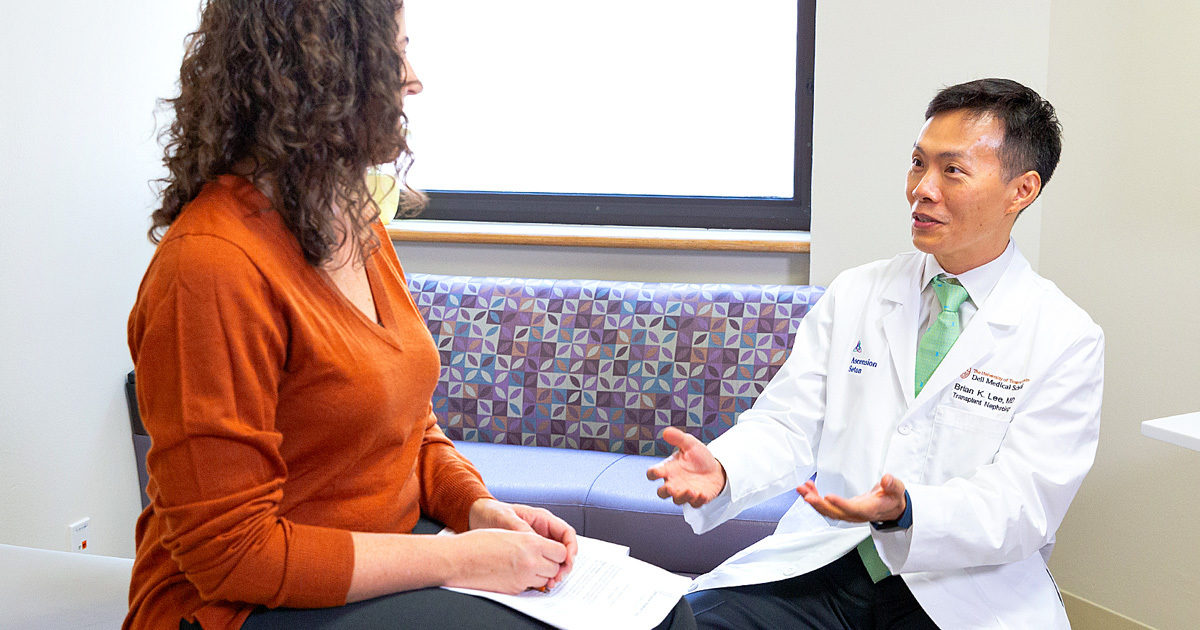Abdominal Transplant Center Offers New Hope for Central Texas and Beyond
UT Health Austin and Ascension Seton partner to offer comprehensive abdominal transplant services
Reviewed by: Nicole Turgeon, MD, FACS
Written by: Ashley Lawrence

UT Health Austin and Ascension Seton are excited to announce the opening of the Abdominal Transplant Center, a clinical partnership between Ascension Seton and UT Health Austin that brings specialized teams across healthcare entities together under the mission of transforming healthcare delivery and redesigning the academic health environment to better serve society.
More than 1 in every 7 adults (approximately 37 million people) in the United States are living with chronic kidney disease, and as many as 9 in every 10 of those adults do not even know they have chronic kidney disease, as kidney disease often has no symptoms in its early stages and can go undetected until it becomes very advanced. As many as 661,000 Americans (including 72,000 in Texas alone) have been diagnosed with end-stage renal disease, or kidney failure.
Chronic kidney disease is a lifelong condition in which the gradual loss of kidney function occurs over time. Kidney failure occurs when the kidneys can no longer function at a level needed for daily life. Treatment options for kidney failure include dialysis, a procedure during which a machine takes over the function of the kidneys by removing the waste products and excess fluid from the blood when the kidneys stop working properly, and transplantation. The most apparent advantage of transplantation over dialysis is enabling patients to return to a more normal lifestyle.
The Kidney Transplant Program is a specialty program within the Abdominal Transplant Center that provides comprehensive care for adult patients with chronic kidney disease or end-stage renal disease. The Kidney Transplant Program care team is comprised of highly specialized transplant providers who work with patients to develop individualized treatment plans, using a combination of research-proven methodologies, such as specialized procedures and new medicines to prevent organ rejection, with the overall goal of increasing the patient’s quality and longevity of life. For patients who meet candidacy for kidney transplantation, their surgery will take place at Dell Seton Medical Center at The University of Texas.
“As a partnership between Ascension Seton, Dell Seton Medical Center, and UT Health Austin, the Kidney Transplant Program leverages the strengths and resources of our clinical leaders and community physicians,” says UT Health Austin kidney and pancreas transplant surgeon Nicole Turgeon, MD, FACS, who serves as the Transplant Director for the Abdominal Transplant Center. “We aim to be recognized as one of the premier solid organ transplant centers in the country. But most importantly, this program is a hopeful resource for patients with complex transplant cases.”
The Kidney Transplant Program utilizes two types of transplant donor sources for patients, living organ donors and deceased, or brain-dead, organ donors. Transplanting a kidney from a healthy donor into a recipient patient with kidney failure is called a living donation. Living kidney donations can come from a compatible donor who is related or unrelated to the recipient patient. Through the Living Kidney Donor Program, a specialty program within the Abdominal Transplant Center, patients have the option to participate in a paired kidney exchange program that helps incompatible pairs of recipients/donors find matches for a kidney transplant. In paired donation, an incompatible donor and recipient pair is matched with another incompatible donor and recipient pair and the kidneys are exchanged between the pairs as a “swap.” This allows the donors to provide two or more patients with healthy kidneys when previously no transplant would have been possible. The average wait time for a transplant through the paired donor kidney exchange program is approximately four months.
Only one donated kidney is needed to replace two failed kidneys, and it is possible to live a healthy life with one kidney, which makes living-donor kidney transplantation an alternative to deceased-donor kidney transplantation. If a living donor isn’t available for a patient, their name will be placed on the United Network for Organ Sharing (UNOS) kidney transplant waitlist to receive a kidney from a deceased donor. The average wait time for a deceased-donor kidney is approximately 4-5 years and increasing with time.
If you are interested in being considered for living kidney donation, please complete the online medical screening questionnaire.
<br>”The transplant program will offer advanced care for kidney failure patients using innovative treatments and state-of-the-art technology. Our collaborative team of renowned surgeons, specialists, and staff will provide excellent care for the Central Texas community,” says Timothy Brierty, who serves as the Regional Hospital President of Dell Seton Medical Center at The University of Texas.
The Abdominal Transplant Center will also offer services for patients in need of a pancreas transplant and those who may need a simultaneous kidney and pancreas transplant later this year. The Abdominal Transplant Center hopes to develop a liver program in the next 3-5 years. Patients in need of a pancreas or liver transplant currently have to travel to San Antonio, Houston, or Dallas to receive care.
For more information about the Abdominal Transplant Center or to make an appointment, please call 1-512-324-7930 or visit here.